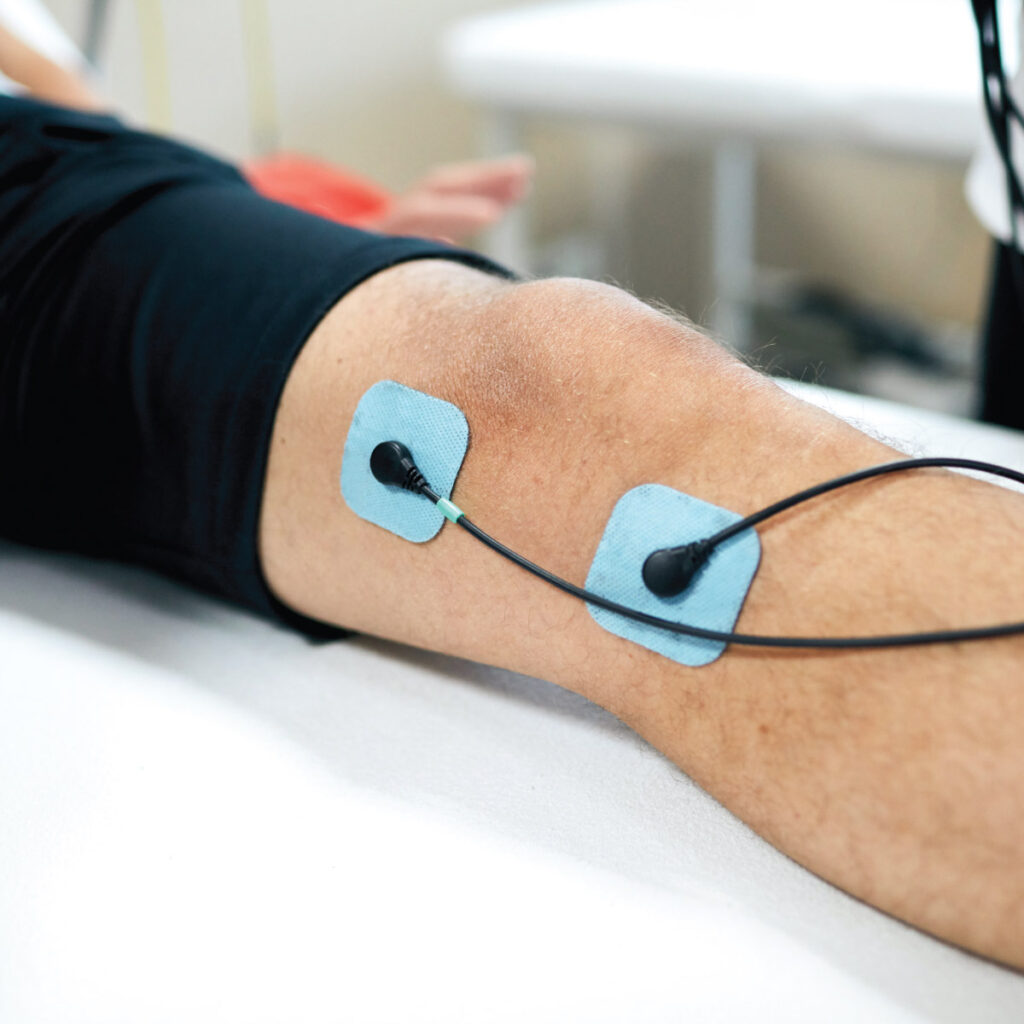In life’s scariest moments, we call upon reliable and timely care. For over 35 years, Erlanger’s LIFE FORCE Air Medical has taken to the skies to deliver life-saving care to patients in need. Here, we take a behind-the-scenes look at the acclaimed air ambulance service.
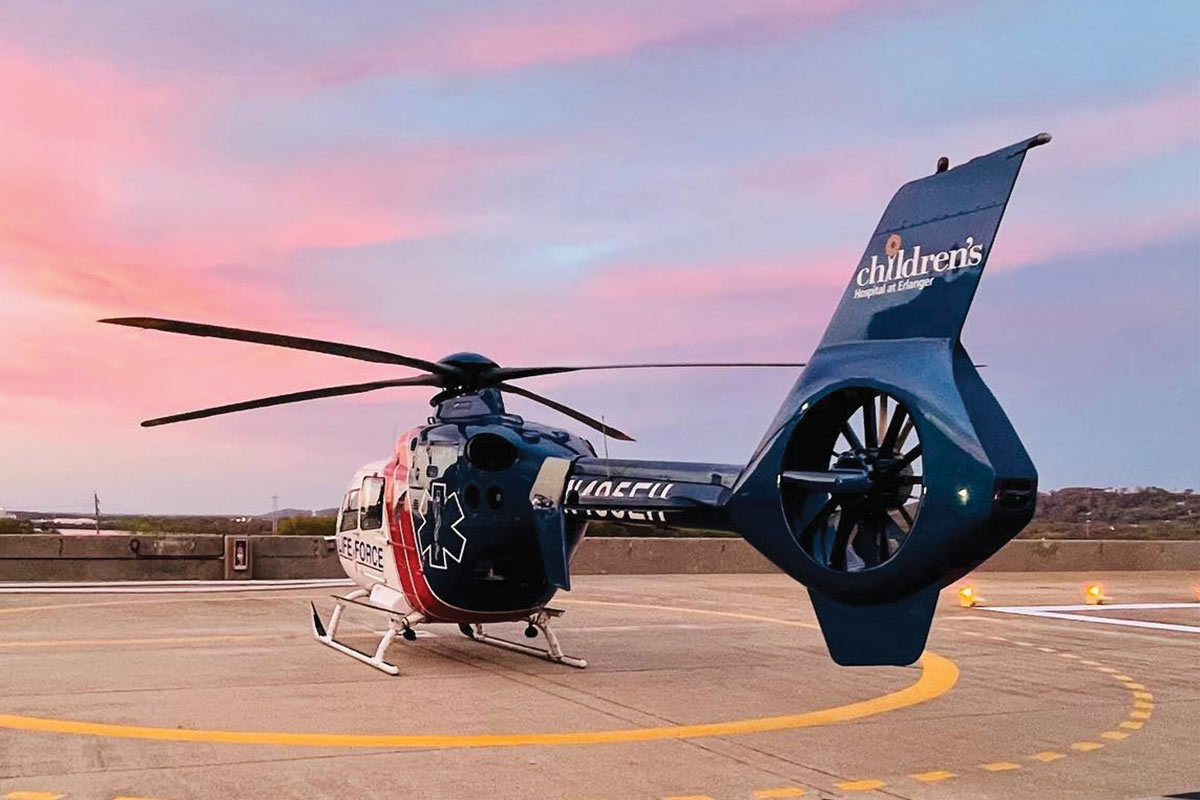
Expanding Emergency Services
Recognizing a need for critical transport services in the Chattanooga region, Erlanger established LIFE FORCE Air Medical in 1988. Ambulance services provide essential care in the wake of an injury or critical illness – but mountainous terrain, hard-to-reach places, and specialized medical conditions make it difficult for certain populations to access emergency care. Air ambulances like LIFE FORCE help bridge this gap.
LIFE FORCE initially serviced the Chattanooga community with a Bell 412 aircraft, a helicopter that could hold two patients, two flight crew members, and a pilot. Since its inception, LIFE FORCE has expanded service to surrounding rural communities, encompassing East Tennessee, North Georgia, Northeast Alabama, and Western North Carolina. With six bases serving over 50,000 square miles in the Southeast, every second counts.
“Time is an enemy of a traumatic insult or medical disease process,” says flight paramedic Richard Medley. “Currently, LIFE FORCE has strategically placed six bases in rural areas with services provided in four states, enabling rapid transport to facilities with a higher level of care. This gives patients in those communities a greater chance of surviving their injury or illness.”
Whether in urban or rural environments, access to timely healthcare can be the difference between life or death. The first 60 minutes following an injury are referred to as “the golden hour,” a crucial period that determines a patient’s outcome. With the help of air transport, critical-care patients can reach a Level 1 Trauma Center like Erlanger, or be taken to Nashville or other cities with specialized healthcare facilities. What could be a two-hour drive via ground transportation is drastically reduced by air ambulance services.
“There’s no doubt that helicopters save lives,” says Eric Breedlove, flight nurse. “Every single flight our team is making a positive difference. I believe we as a team all share the same mindset and are here to make a positive impact and help others during their most vulnerable times.”
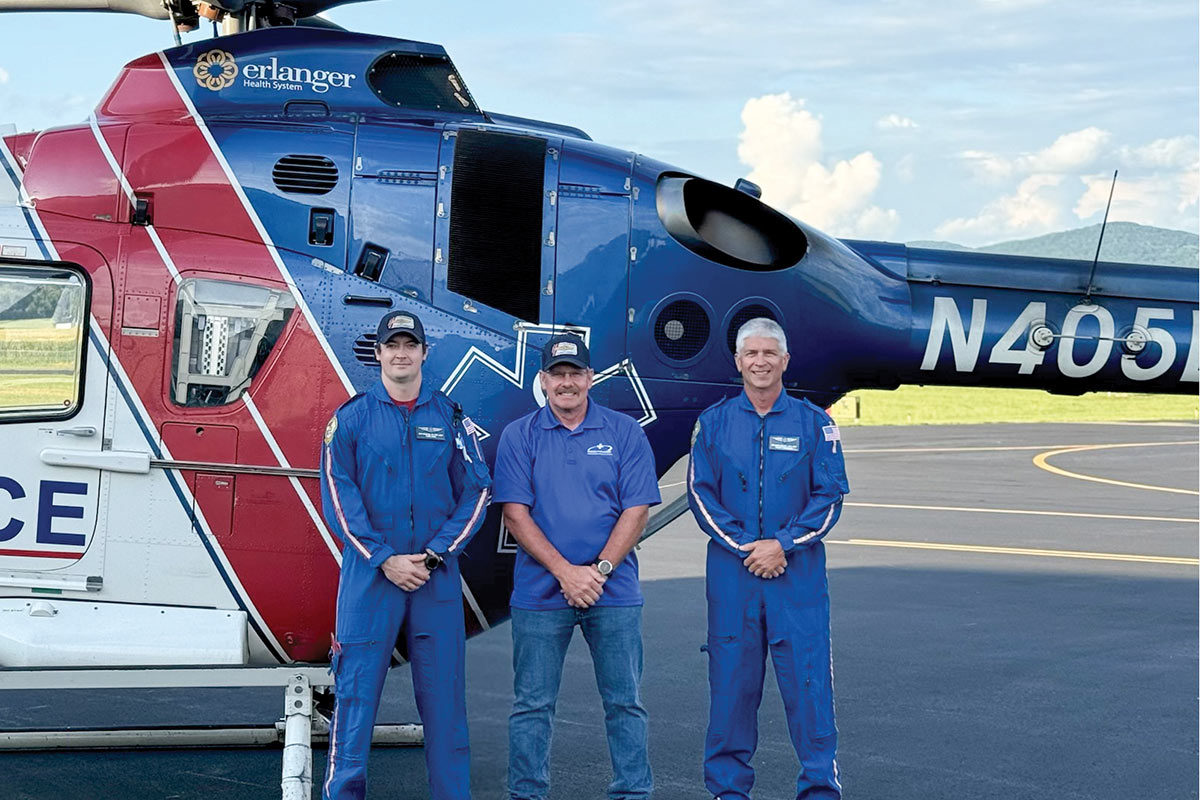
The Highest Standard of Care
For lead A&P mechanic Leon Gerardi, quality patient care begins with a reliable and safe helicopter. “As a maintenance tech, all the thousands of flights that my helicopters and team members have completed over the years are so meaningful to me,” he says. “It gives me such great satisfaction knowing that the helicopter that I maintain is carrying my crew safely so that they can do the job that they do.”
From aircraft to medical equipment, top-notch technology helps maximize the medical attention a patient can receive in-flight. In 2008, LIFE FORCE partnered with Med-Trans Corporation, who took over administration of helicopters, mechanics, and pilots so Erlanger could focus on patient care. Additionally, the program retired the initial Bell 412 and now operates a fleet of six aircraft. The pilots of these aircraft go through intensive training to prepare for any situation.
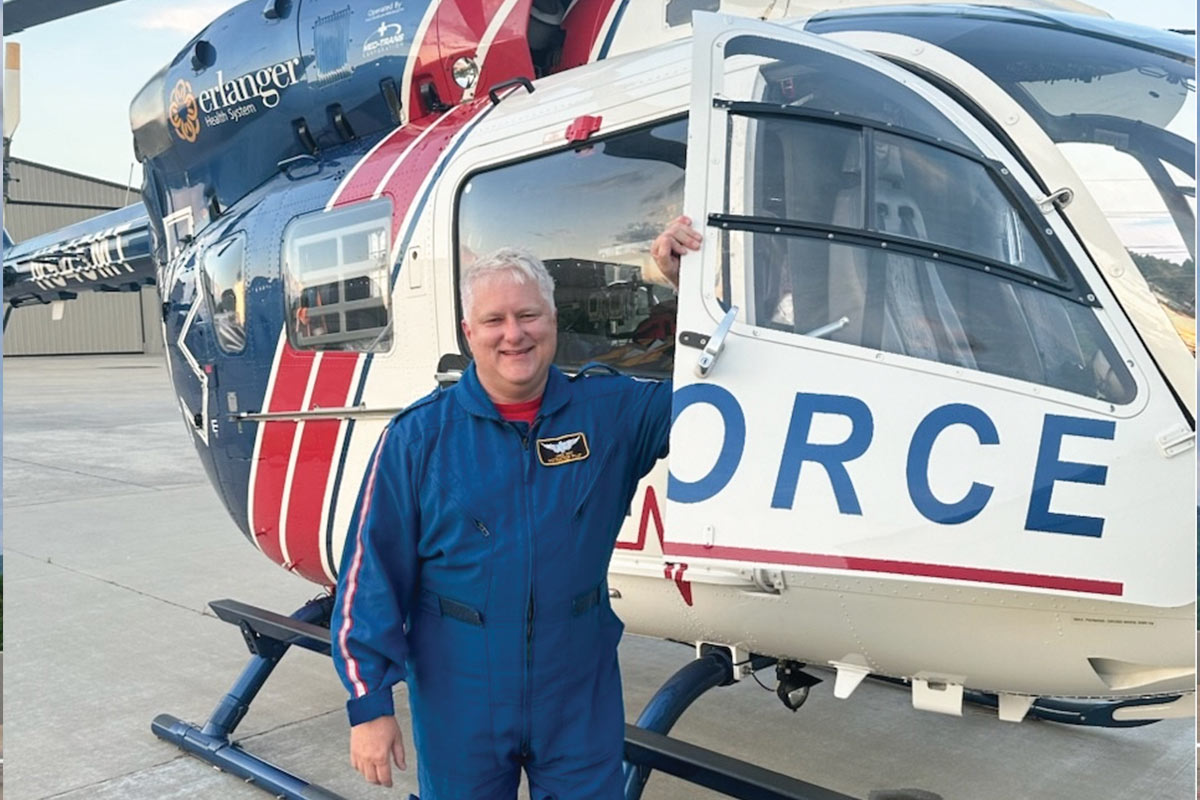
Pilot and base aviation manager Jacob May knew he was destined for this profession from a young age. “When I was a kid riding my bicycle in my neighborhood, I saw an EMS helicopter land and take a critically injured patient from a car accident,” he recalls. “Since that day I’ve always wanted to be an EMS helicopter pilot. I thoroughly enjoy working with some of the best clinicians on the planet, and the teamwork involved in making LIFE FORCE work so well is inspiring to me.”
From mechanics and pilots to medical and communications personnel, the LIFE FORCE team is built on trust. “Most of our providers come from a critical care background prior to coming to LIFE FORCE and have years of experience in the critical care setting, including emergency departments, intensive care units, critical care ground EMS, and high volume 911 EMS services,” says Breedlove. “A strong team consists of great communication skills, diversity in medical background and knowledge among crewmembers, and the ability to trust each other and have accountability.”
One of LIFE FORCE’s most notable milestones, Medley says, is the program’s track record of safe flights for over 35 years of operation. “Our daily operations demand respect for safety to allow us to go home to our own families,” he says. “LIFE FORCE has been vigilant with maintaining safety standards that keeps all involved safe.”
What makes for a strong crew? “Each team member has an important role, and we all support each other. We all know that without each of us doing our part, there would be no LIFE FORCE.”
Leon Gerardi, Lead A&P Mechanic
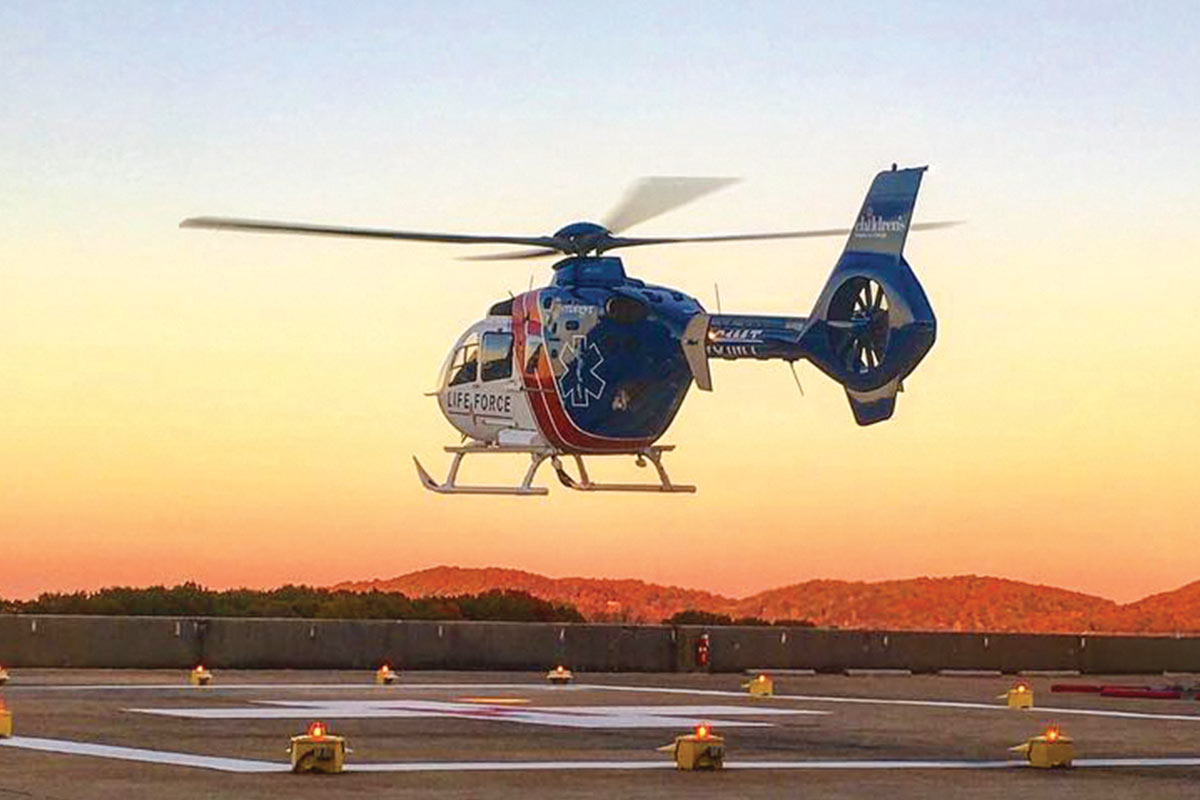
LIFE FORCE Air Medical Regions
- LIFE FORCE 1 – Cleveland, TN
- LIFE FORCE 2 – Sparta, TN
- LIFE FORCE 3 – Calhoun, GA
- LIFE FORCE 4 – Blue Ridge, GA
- LIFE FORCE 5 – Winchester, TN
- LIFE FORCE 6 – Murphy/Andrews, NC
Ready at a Moment’s Notice
The day for the crew begins before dawn. The team has briefings, checks all equipment, and performs any necessary maintenance in preparation for a flight. For the pilots, this includes looking at the weather and gauging flying conditions. “All this generally takes 30 minutes,” says May, “During this window we are capable of taking a flight immediately, provided the pilot determines the flight is both legal and safe. We then conduct administrative duties while waiting for a flight request to come in, but are at all times ready to fly as soon as possible. This requires pilots to always know what the weather is and what it will do for their shift.”
While the pilots are keeping their eyes on the skies, the medical crew makes good use of any down time. “Once complete and ready for flight, we wait until a flight request is initiated by our flight communications center,” says Breedlove. “In the meantime, medical crew members are usually training on advanced skills, reviewing protocols, and completing continuing education.”
The medical team’s association with Erlanger ensures access to ongoing medical advancements and training. “Medicine is constantly evolving,” Medley says. “Our affiliation with Erlanger, a teaching facility, has kept our program up-to-date with the latest evidence-based medicine to ensure the best possible care for our patients.”
In addition to staying current with treatment modalities, LIFE FORCE offers ongoing educational programs with regional hospital staff members and rural EMS services. All in all, LIFE FORCE’s dedication to safety, education, patient care, and community health earned the accolade “Flight Program of the Year” by the Association of Air Medical Services in 2024.
What can patients and their families expect from an experience with LIFE FORCE? “The highest professional care possible in the field and their best chance of a positive outcome on what could be one of their worst days.”
Jacob May, Pilot & Base Aviation Manager
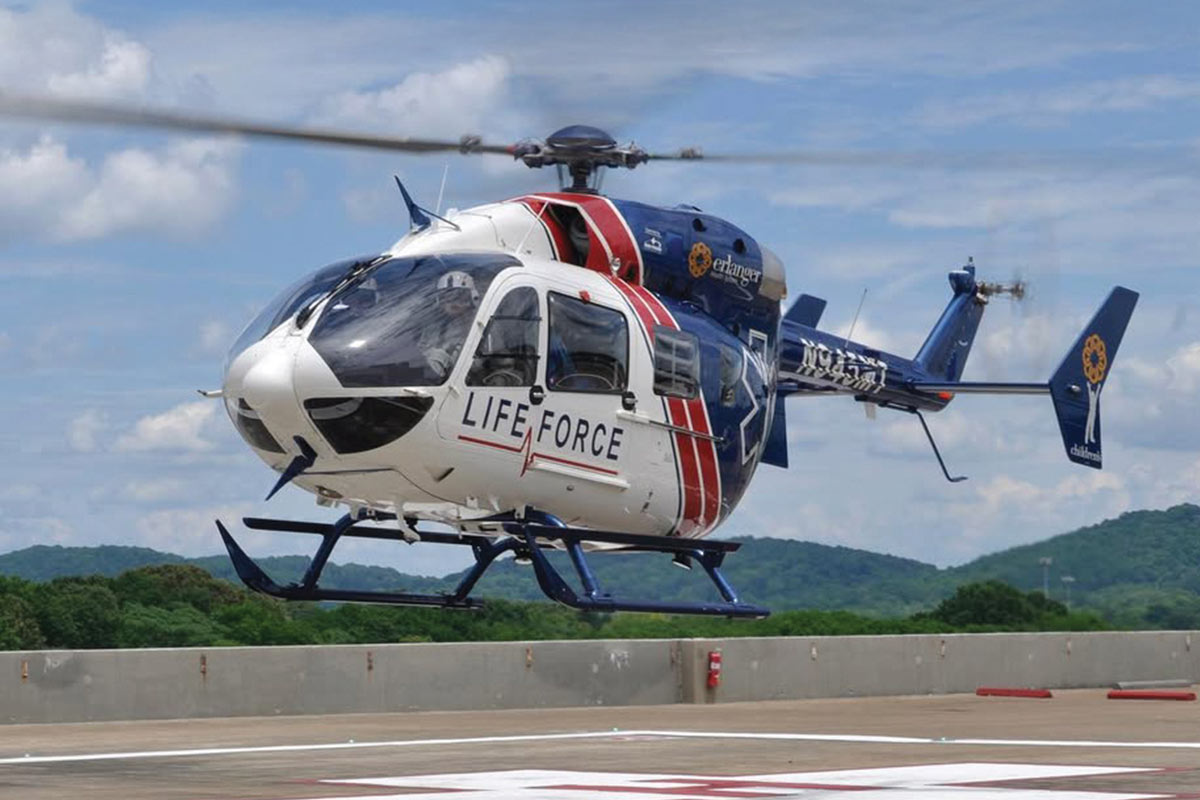
A Lasting Impact
When asked about their most memorable flight, LIFE FORCE crew members say it’s hard to choose just one. “I think the most meaningful flight experiences are the ones that you’re able to follow and see the positive progression of the patient,” says Breedlove. “There have been many flights where the collaboration between ground EMS and LIFE FORCE has ultimately saved a patient.”
LIFE FORCE is able to transport patients of all ages, from infants to geriatrics. The crew’s investment in ongoing training and education pays off each time a patient benefits from treatment. “One common experience that is meaningful is the patients that respond to evidence-based training – whether it’s a medication given or a procedure performed – and the condition of the patient goes from unstable to stable,” says Medley, who also works as a base educator in the program. “If I had to pick one thing, it would be the administration of blood, which has the most dramatic change in a traumatic patient’s condition when needed. It truly is a gift of life that a trauma patient receives.”
Making a positive difference in the lives of patients is what drives the personnel in LIFE FORCE, day in and day out. May recalls an interaction at a car dealership with a man who had been a LIFE FORCE patient: “He found out who I worked for and began to tell me that he was flown, that some of our crews saved his life, and how grateful he was to be alive. Even though it wasn’t me who flew him as a pilot (we don’t have the opportunity to interact with patients like the crewmembers do) it made me realize the impact of what we do every day for our community.”
Since its beginnings, LIFE FORCE has completed over 50,000 patient transports. The passion of the crewmembers is evident as they look to the future of continually delivering quality critical care to the Southeast. “I have been part of this LIFE FORCE family for 30 years, and I think that speaks volumes,” says Gerardi. “I have enjoyed working with the best of the best and my crews are exactly that. Their professionalism is beyond belief. It takes all of us to be LIFE FORCE, and that’s what makes it so great!”
What drives your passion for this profession? “First and foremost, every shift when I clock in, I know 100% in my heart and mind that I am here making a positive difference in peoples’ lives and doing my small part to help people in their time of need.”
Eric Breedlove, RN, CFRN, Flight Nurse & Base Educator
LIFE FORCE Air Medical Timeline
1988
Erlanger launches LIFE FORCE Air Medical flying one Bell 412 aircraft
1994
LIFE FORCE equips a receiver certified to fly Global Positioning System (GPS) approaches, the first helicopter program in the nation to do so
1995
LIFE FORCE 2 begins service based in Sparta, Tennessee
2006
LIFE FORCE 3 begins service based in Calhoun, Georgia
2008
Erlanger partners with Med-Trans Corporation to assist in management
of helicopters, mechanics, and pilots
2010
LIFE FORCE 4 begins service to rural areas of Northeast Georgia and
North Carolina
2015
LIFE FORCE 5 begins service based in Winchester, Tennessee
2016
LIFE FORCE 1 permanently relocates from downtown Chattanooga to new hangar in Cleveland, Tennessee
2017
LIFE FORCE 6 begins service in Andrews, North Carolina
2024
LIFE FORCE Air Medical named “Flight Program of the Year” by the Association of Air Medical Services (AAMS)
2025
LIFE FORCE becomes the first EMS agency in Tennessee equipped and trained to transport injured or critically ill working K-9s
What is something you’d like to share about the LIFE FORCE crew? “Long hours and extra days worked keeps them from their families … so if you see one of these people, a simple word of appreciation goes a long way and will keep them going on their worst day at work.”
Richard Medley, Flight Paramedic & Base Educator
Meet the Author

Tory Irmeger, BA, English
Tory Irmeger graduated from Lee University with a Bachelor of Arts degree in English with an emphasis on creative writing. While at Lee, Tory served as head of copy for the school’s biannual publication Vindagua. Since joining CMC Publications as editor, Tory has led ideation, conceptualization, and development of numerous health, wellness, and lifestyle articles published in print and online for HealthScope, CityScope, and Choose Chattanooga magazines – premier publications serving S.E. Tennessee and North Georgia.




